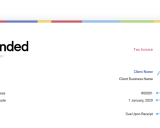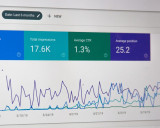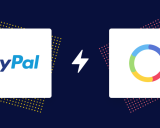Federal Budget Analysis - May 2024
Rounded's co-founder Nicholas Beames explores the recent federal budget and uncovers what's in it for freelancers and sole traders

The Australian Federal Budget for 2024-25 has unveiled several key measures directly affecting sole traders, who are not just participants but key drivers of the nation's economy. These measures aim to ease financial pressures, boost technological adoption, and support sustainable practices among sole traders, recognising their significant role in the economic landscape.
Advance PAYG Instalment Payments
The PAYG Instalment System requires business owners, like sole traders, to make advance payments on their expected tax obligations based on their income. This helps in spreading tax payments over the year instead of paying a lump sum at the end of the year. The GDP Uplift Factor is used to calculate the amount of these instalments.
Previously, it was set at 12%, meaning that the tax instalments were calculated based on the assumption that the trader's income would increase by 12% each year.
The recent budget has introduced a temporary reduction in this uplift factor from 12% to 6% for the income year 2024.
This reduction effectively decreases the amount of money sole traders need to pay in advance for their taxes.
The government allows sole traders to retain more earnings throughout the year by lowering the GDP uplift factor. This change is beneficial as it aids in better cash flow management, offers more liquidity, and reduces financial strain due to lower advance tax payments.
Overall, this change allows them to manage their cash flow more effectively and invest that money back into their businesses, or cover other expenses.
Instant Asset Write-off
This tax provision allows businesses (including sole traders) with aggregated turnover of less than $10 million, to immediately deduct the total cost of purchasing eligible assets of up to $20,000 from their taxable income. This deduction is claimed in the year the asset is first used or installed ready for use.
The main goal of this measure is to stimulate economic activity by encouraging small businesses to invest in assets. This can include anything from office equipment and tools to vehicles, depending on what is necessary for the business.
By enabling businesses to deduct the cost of these assets immediately, the policy can reduce the tax the business owes in that financial year.
Benefits to Sole Traders include:
Improved cashflow: This effectively frees up cash that can be reinvested into the business or used for other purposes.
An Incentive to invest: The ability to write off the total cost of an asset immediately is a strong incentive for businesses to invest in new or upgraded tools of trade whilst lowering their immediate tax burden. This relief is crucial as it can make the difference between struggling to stay afloat and being able to grow.
The extension of this write-off lasts until June 30, 2025: The predictability and extended availability of the benefit allow businesses to plan their investments with certainty over the next few years, fostering long-term stability and growth.
HECS Debts Recalibration
The recent adjustments to the Higher Education Contribution Scheme (HECS) offer new opportunities for sole traders to enhance their financial planning. Lowering the repayment threshold to $48,361 allows repayments to start at a more modest income level.
This change promotes earlier engagement with financial obligations and can lead to quicker resolution of educational debts. Additionally, the recalibration of repayment rates helps manage budgets more effectively.
Energy Efficiency
The budget also introduces a Small Business Energy Incentive, providing an additional 20% deduction for eligible depreciating assets that support energy efficiency. This includes assets like electric heating or cooling systems, heat pumps, and energy-efficient appliances, with a spending cap set at $100,000.
However, it's important to note electric vehicles and renewable energy generation assets are excluded from this incentive, which may impact the ability of some sole traders to invest in sustainable energy solutions.
Technological Support
Technological advancements are also a focal point of this year's budget, emphasising reducing the 'mistake anxiety' many sole traders experience during tax submissions. Software solutions like Rounded are expected to streamline tax filing processes, improve accuracy, and reduce sole traders' time on administrative tasks.
In the federal budget context, promoting such technology solutions reflects a strategic effort to support small business owners by making compliance less burdensome and more efficient.
This should free up more time for you to focus on your business operations and growth strategies.
Conclusion
Overall, the 2024 Federal Budget offers a mixed bag of benefits for sole traders in Australia. While it introduces some financial reliefs and incentives for investment and sustainability, significant challenges remain. The exclusions in the energy incentives may limit the options for some sole traders to invest in energy-efficient assets.
Additionally, the ongoing need for technological integration to ease administrative burdens may pose challenges for those who need to be more technologically savvy.
The response from the sole trader community will likely vary. Many are poised to take advantage of technological aid and financial relief, while others may find the measures insufficient for their specific needs. As the budget's implications unfold, sole traders must stay informed and adaptable to navigate the changes effectively.
Join newsletter
ABOUT ROUNDED
Invoicing and accounting software for sole traders. Get paid faster and relax at tax time.


























-p-1600.jpeg)
